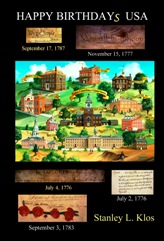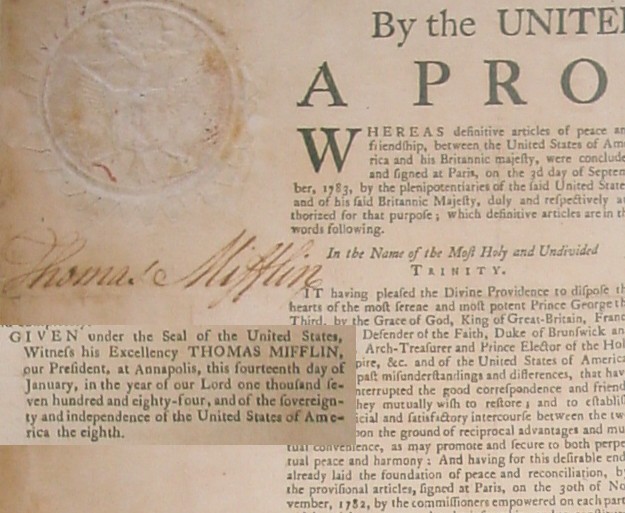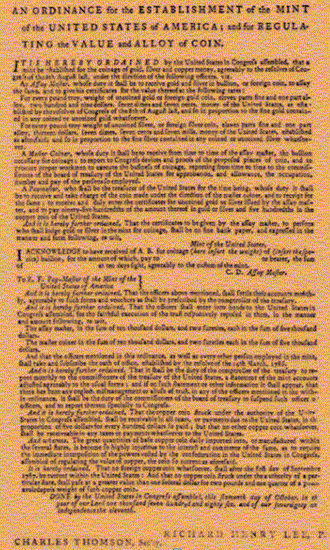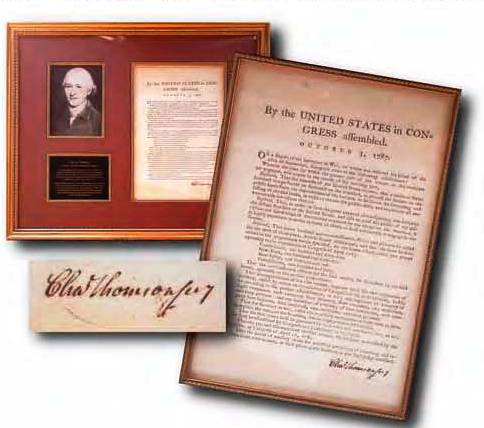|

New Page 3
Happy Birthdays
USA
The US Founding Handbook:
Birthdates, Capitols and Presidents

Chapter
Ten:
The US Presidency
(Abridged -
Contuned)
By: Stanley
L. Klos
U.S. Founding Presidential Point
Six – The
Presidents of the United States, in Congress Assembled:
Nine more Presidents of the United States under the Articles of
Confederation were duly elected by the delegates after Samuel Huntington.
Presidents of the United
States in Congress Assembled
|
Samuel Huntington* |
September 28, 1779 |
July 6, 1781 |
|
Thomas McKean |
July 10, 1781 |
November 4, 1781 |
|
John Hanson |
November 5, 1781 |
November 3, 1782 |
|
Elias Boudinot |
November 4, 1782 |
November 2, 1783 |
|
Thomas Mifflin |
November 3, 1783 |
November 2, 1784** |
|
Richard Henry Lee |
November 30, 1784 |
November 22, 1785 |
|
John Hancock |
November 23, 1785 |
June 5, 1786 |
|
Nathaniel Gorham |
June 6, 1786 |
November 13, 1786 |
|
Arthur St. Clair |
February 2, 1787 |
October 29, 1787 |
|
Cyrus Griffin |
January 22, 1788 |
January 21, 1789 |
United States in Congress Assembled
*Huntington was elected as President of
the Continental Congress but
ascended to the United States Presidency on March 2, 1781
under the Constitution of 1777 -- The Articles of Confederation
United States, in Congress Assembled Sessions
1781 to 1789
First
USCA:
March 2, 1781 - Samuel Huntington
and Thomas McKean
Presidents
Second USCA:
November 5, 1781 - John Hanson
President
Third USCA: November 4, 1782 - Elias Boudinot
President
Fourth USCA: November 3, 1783 - Thomas Mifflin
President
Fifth USCA:
November 29, 1784 - Richard Henry Lee
President
Sixth USCA
and Nathaniel Gorham
Presidents
Seventh USCA:
February 2, 1787 - Arthur St. Clair
President
Eighth USCA
January 21, 1788 - Cyrus Griffin
President
U.S. Founding Presidential Point
Seven –
Unicameral Presidential duties:
-
These Presidents utilized their
office to exercise much influence on United States public affairs and
legislation.
-
The Presidents and his
delegation each had one vote of thirteen possible votes in the unicameral
government. Quite often their yes or no represented 1/9th of all
the votes required in quorums necessary to enact legislation under the
Constitution of 1777.
-
All the Presidents presided, in
a voting “Speaker of the House Capacity,” over the judicial,
legislative and executive business of the unicameral government.
-
Presidents also had the power
to call for the unicameral government’s assembly and adjournment.
-
Presidents received, read,
answered, and at their own discretion held or disseminated the official state
and foreign unicameral correspondence.
-
Presidents chaired the
Committee of the States that governed the United States of America when
the United States, in Congress Assembled was not in session.
[viii]
-
Presidents received both United
States and foreign dignitaries when they arrived at the Capitol as the Head of
State extending the nation’s official hospitality.
[ix]
-
Presidents acted similar to
Supreme Court Chief Justices presiding over cases such as Federal Court
Appeals,
[x]
Death Penalty Appeals,
[xi]
Military trials
[xii]
and State boundary disputes.
[xiii]
-
Presidents, although not
serving as Commander-in-Chief, issued military orders:
![September 14, 1782 President John Hanson U.S. Military directive to George Washington, Journals of The United States in Congress Assembled, [xiv]– Stan Klos Collection.](http://images.virtualology.com/images/5307.jpg)
September 14, 1782 President John Hanson U.S.
Military directive to George Washington, Journals of The United States in
Congress Assembled,
[xiv]–
Stan Klos Collection.

President Arthur St. Clair signed
U.S. Military Commission October 26, 1787
Original Manuscript Stan Klos Collection

President Samuel Huntington signed U.S. Military
Commission
Original Manuscript Stan Klos Collection
[xv]
![President Thomas McKean signs Joseph de L’ Etombe Consul General of France U.S. Commission Journals of the United States in Congress Assembled [xvi] – Stan Klos Collection](http://images.virtualology.com/images/5310.jpg)
President Thomas McKean
signs Joseph de L’ Etombe Consul General of France U.S. Commission Journals of
the United States in Congress Assembled
[xvi]
– Stan Klos Collection

Treaty of Paris Ending the War with Great Britain
ratified by Thomas as President of the United States
The Library Of Congress Broadside Collection[xvii]

U.S. Ordinance For The
Establishment of the Mint
of The United States of America signed Richard Henry Lee, P (President)
Library of Congress Broadside Collection
[xviii]
U.S. Founding Presidential Point Eight –
U.S. Presidential compensation:

From The Estimate
of the Annual Expenditure of the Civil Departments of the
United States Presidential Household Budget for the year 1785
Library of Congress Broadside Collection
[xix]
-
The government of the United
States provided for the President’s expenses, servants, clerks, housing, and
transportation. Their home state was expected to provide for their salary.
U.S. Founding Presidential Point
Nine – the
Second U.S. Constitution:
-
On June 21, 1788 New
Hampshire became the 9th State to ratify the U.S. Constitution of
1787 thereby meeting the 2/3rds requirement and dissolving the Articles of
Confederation. In July 1788, the United States, in Congress Assembled
officially reported that 11 States ratified the Constitution of 1787.
-
In the Spring of 1789, the
unicameral federal government of the United States was replaced by the new
government with three distinct branches:
Executive - President George
Washington
Judicial – Supreme Court Chief
Justice John Jay
Legislative – U.S. Senate
President John Adams and U.S. House Speaker Frederick A.C. Muhlenberg.
The Articles of Confederation, however, required all thirteen
States to approve the new the Constitution of 1787. This was finally
accomplished on May 29, 1790 with the ratification of Rhode Island 13 months
after President George Washington took his oath of office.
Presidents of the United States
under the Constitution of 1787
George Washington (I)
John Adams (F)
Thomas Jefferson (D-R)
James Madison (D-R)
James Monroe (D-R)
John Quincy Adams (W)
Andrew Jackson (D)
Martin Van Buren (D)
William H. Harrison (W)
John Tyler (W)
James K. Polk (D)
David Atchison (D)*
Zachary Taylor (W)
Millard Fillmore (W)
Franklin Pierce (D)
James Buchanan (D)
Abraham Lincoln (R)
Jefferson Davis (D)**
Andrew Johnson (R)
Ulysses S. Grant (R)
Rutherford B. Hayes (R)
James A. Garfield (R)
Chester Arthur (R)
Grover Cleveland (D)
Benjamin Harrison (R)
Grover Cleveland (D)
William McKinley (R)
Theodore Roosevelt (R)
William H. Taft (R)
Wilson Woodrow (D)
Warren G. Harding (R)
Calvin Coolidge (R)
Herbert C. Hoover (R)
Franklin D. Roosevelt (D)
Harry S. Truman (D)
Dwight D. Eisenhower (R)
John F. Kennedy (D)
Lyndon B. Johnson (D)
Richard M. Nixon (R)
Gerald R. Ford (R)
James Earl Carter, Jr. (D)
Ronald Wilson Reagan (R)
George H. W. Bush (R)
William Jefferson Clinton (D)
George W. Bush (R)
Barack H. Obama (D)
*President for One Day
**President Confederate States of America
Current Order of Presidential Succession
The Vice President
Speaker of the House
President pro tempore of the Senate
Secretary of State
Secretary of the Treasury
Secretary of Defense
Attorney General
Secretary of the Interior
Secretary of Agriculture
Secretary of Commerce
Secretary of Labor
Secretary of Health and Human Services
Secretary of Housing and Urban Development
Secretary of Transportation
Secretary of Energy
Secretary of Education
Secretary of Veterans Affairs
U.S. Founding Presidential Point
Ten –
Unicameral government extinction:
-
In 1788 the President of the
United States, in Congress Assembled, under the unicameral federal government,
ceased to exist as Cyrus Griffin’s one year term expired on January 21, 1789.
A quorum was never formed to elect an 11th President of the United States, in
Congress Assembled.
-
Charles Thomson, Secretary of
the United States, in Congress Assembled continued to conduct the business of
this body from offices located in Fraunces Tavern in New York City until March
2, 1789. On March 4, 1789 the new government went into effect.

Charles Thomson
Signed Broadside, November 3, 1787 – Original Manuscript
Stan Klos Collection - www.CharlesThomson.com
U.S. Founding Presidential Point
Eleven – The
formation and preservation of the Perpetual Union:
-
The Articles of Confederation
not only formed the Union but its language was utilized by President Abraham
Lincoln, together with the second U.S. Constitution, as the legal grounds to
wage war to “Preserve the Union."
-
On July 4, 1861 President
Abraham Lincoln appeared before a special session of the United States
Congress. At this session Lincoln maintained that original Colonies were
legally bound to the United States by both the Constitutions of 1787 and
1777 stating:
“... while that name was first
adopted by the old ones in and by the Declaration of Independence. Therein the
"United Colonies" were declared to be "free and independent states;" but, even
then, the object plainly was not to declare their independence of one another,
or of the Union, but directly the contrary, as their mutual pledge and their
mutual action before, at the time, and afterwards, abundantly show. The express
plighting of faith by each and all of the original thirteen in the Articles of
Confederation, two years later, that the Union shall be perpetual, is most
conclusive.”

Above is an excerpt from Lincoln's Address with changes in his
hand summarizing the birth, formation and the establishment of a “more perfect”
Constitution of the Perpetual Union of the United States of America
- Courtesy of the Manuscript Division of the Library of Congress.[xx]
[i]
JCC, 1774-1789, July
2, 1776 Independence Declared From Great Britain.
[ii] Ibid,
March 1, 1781, Articles of Confederation Ratified
[iii]
Library of Congress, Rare Book and Special Collections Division, Continental
Congress & Constitutional Convention Broadsides Collection
[iv]
JCC, 1774-1789, United
States, in Congress Assembled, March 2, 1781
[v] The
Documentary History of the Ratification of the Constitution: Vol. 1:
Constitutional Documents and Records, 1776-1787, ed. Merrill Jensen,
Madison, Wis.: State Historical Society of Wisconsin, 1976; Encyclopedia
of American History: Bicentennial Edition, ed. Richard Morris, New York;
Harper & Row, 1976; Documents of American History, ed. Henry Steele
Commanger, Englewood Cliffs, NJ; Prentice-Hall, 1973
[vi]
Journals of United States in Congress Assembled, Patterson, March 2, 1781
[vii]
Smith, Paul H., et al., eds.
Letters of Delegates to Congress, 1774-1789.
25 volumes, Washington, D.C.: Library of Congress, 1976-2000).
[viii]
Ibid, Articles of Confederation, Article IX, March 1, 1781
|



























































